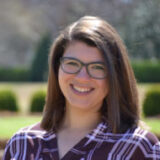Angela Bell

Psychology
What motivated to apply for an information literacy (IL) grant for PYSC 327 Advanced Social Psychology?
In fall 2017, I attended an IL brownbag, during which the spring 2017 grant recipients discussed their experiences. I was inspired by their work, particularly by Professor Seo-Hyun Park’s collaboration with Lijuan Xu. I wanted a librarian’s help in developing course assignments.
What were your goals for your class?
I wanted students to understand that conducting research is about joining an existing scholarly conversation. I expected them to review both historical and contemporary issues, such as the replication crisis. The replication crisis has been discussed a lot in my field and it has to do with the inability to replicate research that has been published. Ideally, if you read an article and follow all the steps outlined in the methods and results section of the article, you should be able to replicate the same effects as the article’s authors did. However, more and more replication studies are being conducted but many effects are not replicating or found in the same ways.
What projects did you assign?
Students worked in groups of four on two projects, a replication study and an extension study. For the replication study, students first read articles that I assigned and selected one study to replicate. They tried to replicate all the materials possible and if they could not they substituted what they could with other materials that were as close to the original materials as possible. This is where the students struggled: how do they do a replication if they cannot faithfully replicate something, and how can they gain access to materials? Students had to follow the threads of the article, go to the authors’ web site, or find the original article in which a measure first appeared.
For the second half of the semester, students worked on an extension study, for which they could do a conceptual extension, replicate the research methods, or use a different variable. They had to develop a new research question and incorporated a theory from the study that they replicated as well as additional research. In their presentation, students discussed the significance and real world applications of their projects.
Did the discussion about the replication crisis and students’ own challenge in replicating the study make students skeptical of scientific research?
There seemed to be a real divide in the class. One of the students is doing thesis with me because of the class but some felt quite negative about the potential failure and risk in conducting research. It was a challenge to teach skepticism about science without discouraging students. I want students to be critical of what they read but I do not want them to discount the research entirely. I want students to understand the decisions being made during the research and publication process. For example, information might be omitted between the time research is conducted and when it is published. Authors have to follow journal-specific rules, might not own stimuli or methods, or cannot share materials due to copyright restrictions and ethical considerations regarding their participants. Fortunately, there are initiatives like the Open Science Framework that encourage researchers to share data and supplementary study materials, so my students were following these practices.
Could you talk about some of the challenges in communicating scientific information to lay audience?
When researchers communicate their research to a larger audience, like in a Ted talk, they need to be performative and often do not have room to mention the nuanced decisions that they made about their research. One thing I am really grateful about the grant was that it allowed me to incorporate evaluations of how we adapt research. It was wonderful to watch my students progress throughout the semester; by the end of the class they were talking about how they would want their research to be conveyed in the public sphere, and how important it was for all researchers to engage in open and transparent science practices.
What was the role of the librarian?
Lijuan challenged me to be more thoughtful about the questions I asked my students and the work I assigned. We worked together before the semester to develop the replication and extension projects. It was great to share and discuss my motivations and goals with her for different class components. It was also really nice to have her in the classroom so that students could easily turn to her for help. Students were also more thoughtful in discussing their research because we had a non-psychologist in the classroom.
Overall, how did the class go?
I am happy with how the class went although it was a lot to ask students to conduct two full-blown studies within the course of the semester. In the future, I will have students propose how they would extend a study rather than actually conduct it. I enjoyed the collaborative experience and I want to do it again. There is room for a librarian in all my classes.
What do you think professors and librarians could do to help students develop their critical thinking and IL skills?
I think treating students as fellow researchers will help them take on the responsibility of practicing science and being more critical in their thinking. I also think asking students to evaluate research and let them be honest about what they do and do not like about it encourages important conversations. There are different aspects of the research process that are more challenging for some students than others. I share my own challenges with research. This kind of conversation helps students identify their strengths and weaknesses, and think about how to further develop their research skills.